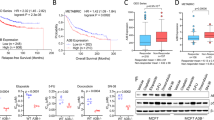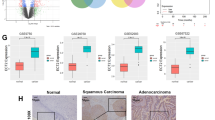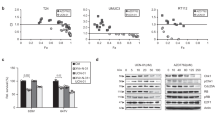Abstract
In order to investigate the molecular mechanisms implicated in the induction of chemo sensitivity by adenovirus E1a gene expression, we decided to investigate which signal transduction pathways could be affected by the E1a gene in Human Normal Fibroblast (IMR90). No effect was observed in SAPK pathways (p38MAPK and JNK), but E1a was able to affect the Akt activation mediated by insulin. This result was confirmed by transient transfection experiments performed in Cos-7 cells and also observed in other transformed cell lines such as A431. Furthermore, E1a expression induces a decrease in the basal status of Akt activity. Finally we demonstrated that E1a is able to block the Akt activation mediated by cisplatin and correlates with a sensitive phenotype. In summary, our data demonstrate that specific inhibition of the PI3K/Akt pathway mediates some of the biological properties of E1a such as induction of chemosensitivity.
This is a preview of subscription content, access via your institution
Access options
Subscribe to this journal
Receive 50 print issues and online access
$259.00 per year
only $5.18 per issue
Buy this article
- Purchase on Springer Link
- Instant access to full article PDF
Prices may be subject to local taxes which are calculated during checkout




Similar content being viewed by others
References
Alessi DR, Andjelkovic M, Caudwell B, Cron P, Morrice N, Cohen P, Hemmings BA . 1996 EMBO J. 15: 6541–6551
Brognard J, Clark AS, Ni Y, Dennis PA . 2001 Cancer Res. 61: 3986–3997
Franza Jr BR, Maruyama K, Garrels JI, Ruley HE . 1986 Cell 44: 409–418
Frisch SM . 2001 Adv. Cancer Res. 80: 39–49
Frisch SM, Mymryk JS . 2002 Nat. Rev. Mol. Cell. Biol. 3: 441–452
Gallimore PH, Turnell AS . 2001 Oncogene 20: 7824–7835
Guo S, Cichy SB, He X, Yang Q, Ragland M, Ghosh AK, Johnson PF, Unterman TG . 2001 J. Biol. Chem. 276: 8516–8523
Hayakawa J, Ohmichi M, Kurachi H, Kanda Y, Hisamoto K, Nishio Y, Adachi K, Tasaka K, Kanzaki T, Murata Y . 2000 Cancer Res. 60: 5988–5994
Kim HS, Lee JK, Tsai SY . 1995 Mol. Endocrinol. 9: 178–186
Lee WP, Liao Y, Robinson D, Kung HJ, Liu ET, Hung MC . 1999 Mol. Cell. Biol. 19: 8075–8082
Maira SM, Galetic I, Brazil DP, Kaech S, Ingley E, Thelen M, Hemmings BA . 2001 Science 294: 374–380
Mitsuuchi Y, Johnson SW, Selvakumaran M, Williams SJ, Hamilton TC, Testa JR . 2000 Cancer Res. 60: 5390–5394
Ng SS, Tsao MS, Nicklee T, Hedley DW . 2001 Clin. Cancer Res. 7: 3269–3275
Razzini G, Berrie CP, Vignati S, Broggini M, Mascetta G, Brancaccio A, Falasca M . 2000 FASEB J. 14: 1179–1187
Rodriguez-Viciana P, Warne PH, Dhand R, Vanhaesebroeck B, Gout I, Fry MJ, Waterfield MD, Downward J . 1994 Nature 370: 527–532
Saltiel AR, Kahn CR . 2001 Nature 414: 799–806
Sanchez-Prieto R, Quintanilla M, Cano A, Leonart ML, Martin P, Anaya A, Ramon y Cajal S . 1996 Oncogene 13: 1083–1092
See RH, Shi Y . 1998 Mol. Cell. Biol. 18: 4012–4022
Shao R, Karunagaran D, Zhou BP, Li K, Lo SS, Deng J, Chiao P, Hung MC . 1997 J. Biol. Chem. 272: 32739–32742
Shao R, Tsai EM, Wei K, von Lindern R, Chen YH, Makino K, Hung MC . 2001 Cancer Res. 61: 7413–7416
Shayesth L, Lu Y, Kuo W, Baldocchi R, Godfrey T, Collins C, Pinkel D, Powel B, Mills G, Gray J . 1999 Nature Genetics 21: 99–102
Simpson L, Parsons R . 2001 Exp. Cell Res. 264: 29–41
Stein RW, Whelan J . 1989 Mol. Cell. Biol. 9: 4531–4534
Teodoro JG, Shore GC, Branton PE . 1995 Oncogene 11: 467–474
Whalen SG, Marcellus RC, Whalen A, Ahn NG, Ricciardi RP, Branton PE . 1997 J. Virol. 71: 3545–3553
Yu D, Suen TC, Yan DH, Chang LS, Hung MC . 1990 Proc. Natl. Acad. Sci. USA 87: 4499–4503
Acknowledgements
We appreciate the comments and helpful discussions of Drs L del Peso, J Recio and M Serrano. We also wish to thank M Hadley-Adams for his assistance with the manuscript and A Sánchez López and L Grijander for technical assistance. This work was supported by grants from FIS (01/0475) CAM (081/0005/2001). J Guinea Viniegra and VM Fernández Soria were supported by the Fondo Social Europeo from Consejeria de Educación de la Comunidad de Madrid. C Parada Cobo was supported by the Fondo de Investigaciones Sanitarias (00/9039).
Author information
Authors and Affiliations
Corresponding authors
Rights and permissions
About this article
Cite this article
Viniegra, J., Losa, J., Sánchez-Arévalo, V. et al. Modulation of PI3K/Akt pathway by E1a mediates sensitivity to cisplatin. Oncogene 21, 7131–7136 (2002). https://doi.org/10.1038/sj.onc.1205934
Received:
Revised:
Accepted:
Published:
Issue Date:
DOI: https://doi.org/10.1038/sj.onc.1205934
Keywords
This article is cited by
-
Cisplatin and phenanthriplatin modulate long-noncoding RNA expression in A549 and IMR90 cells revealing regulation of microRNAs, Wnt/β-catenin and TGF-β signaling
Scientific Reports (2021)
-
Prognostic importance of CDK4/6-specific activity as a predictive marker for recurrence in patients with endometrial cancer, with or without adjuvant chemotherapy
British Journal of Cancer (2015)
-
The Anti-Tumor Activity of E1A and its Implications in Cancer Therapy
Archivum Immunologiae et Therapiae Experimentalis (2014)
-
Overexpressing cellular repressor of E1A-stimulated genes protects mesenchymal stem cells against hypoxia- and serum deprivation-induced apoptosis by activation of PI3K/Akt
Apoptosis (2010)
-
Cisplatin induces PKB/Akt activation and p38MAPK phosphorylation of the EGF receptor
Oncogene (2006)



